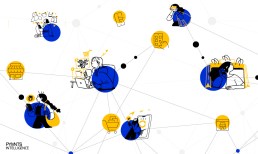B2B Breakthrough: Discover, Ariba Launch AribaPay

Really and truly solving the B2B payments’ problem over the years has been a little bit like proving Fermat’s last theorem – lots and lots have tried and a few have even gotten pretty close. But no one has been able to enter the market with a scalable, electronic solution attractive enough to both buyers and sellers that they are willing to ditch the defacto B2B payments solution – the paper check. Ariba and Discover could be to B2B payments what Andrew Wiles was to Fermat’s theorem – the entities that finally solve the problem.
AribaPay, the electronic B2B payments solution, launched today by Ariba and powered by the Discover Network, is reported to “solve the last mile” of B2B payments by offering an “efficient and transparent” way for buyers to pay suppliers. Here’s how it works and some background to put the solution in proper context below. (Also, visit www.discover.discovernetwork.com/emerging-commerce for a demonstration video of how AribaPay works.)
Checks may be dying everywhere else in the world (and declared dead outside of the U.S. a long time ago) but they are alive and well in B2B payments land. Billions, yes billions, of checks (worth tens of trillions of dollars) are written each year by buyers and sent to suppliers to settle invoices (that in many cases are actually sent to them electronically). Why? Well, believe it or not, as archaic as paper checks are in this new digital age, they are pretty easy for buyers to issue. All that’s needed is the name of the supplier and a mailing address and voila: a check can be issued for payment. Electronic alternatives such as ACH-based solutions require that the buyer ask for the supplier’s banking information and then actually take ownership of initiating payment directly into those bank accounts. Many large buyers either don’t want to do that – especially for the one-offs to suppliers for whom they don’t have a regular payment relationship – or don’t have systems that allow them to. Sellers, on the other hand, would give up bank account numbers all day long to be paid more quickly, to actually know when they are getting paid, and to avoid schlepping to the bank to deposit checks, which only adds further to their delay in receiving payment.
P-cards were introduced as a way to make things easier for suppliers to be paid (as well as for buyers to control spending), but suppliers weren’t all that enthusiastic about taking a 1 to 2 percent (or more) haircut on their invoices when paid with a card. And, we all know the tale of the smaller supplier who may not even take cards and would have to establish (and get) a merchant account to accept them. And, it takes two to tango in payments-land and unless (in this case) suppliers and buyers want to dance together at the same time to the same song, well, the orchestra never even bothers to show up.
Enter AribaPay and actually another pretty clever example of the Discover Network in action. In its first non-card based use case, AribaPay via the Discover Network will enable a buyer to initiate an electronic payment from its bank account, which Discover will then direct to the supplier’s bank account. Discover, as the enabling platform, will handle all settlement functions and will hold banking information. Buyers don’t have to mess with getting and keeping bank account information for suppliers, which according to Ariba and Discover’s research and beta test participants, is said to be a huge win. And, unlike card acceptance, the only requirement is for both buyers and suppliers to be on the Ariba network, which many are. Quite naturally, a huge focus now for both Ariba and Discover is getting suppliers enabled to receive payment via AribaPay. But, once a supplier has an AribaPay “account” established, she can use it to accept payment from any AribaPay buyer. In that way, one can think of AribaPay as sort of a PayPal for B2B payments.
Enabling those suppliers and creating those “accounts” is where the rubber will actually meet the road. And what it costs will be a huge factor in ultimately igniting AribaPay.
Business models and pricing at this moment are still TBD, but promised to be “aggressive, transformative,” and “lower than the cost of processing paper checks and card payments.” That could be huge and frankly will need to be. Suppliers, who are always motivated to be paid sooner and electronically, probably won’t need a whole lot of convincing to hop onto AribaPay – that is, if enough of their buyers are waiting in the wings to pay them. Buyers, especially the big guys, will probably need the nudge since any change, even for the better, requires a change to their business processes – something that is never easy to do, even if the solution being proposed is better. That has generally been the ant at the picnic in igniting B2B payments.
Ariba and Discover both say on that score, timing is everything and that they are coming to market with a solution that buyers are looking for. Based on conversations they’ve had about AribaPay, they say that companies are actively seeking ways to reduce the costs doesn’t take an Andrew Wiles-level mathematician to know that electronic processing of AP and AR is way cheaper than processing paper checks. Corporates, therefore, see streamlining AP and AR function as an easy and logical target. I would imagine paper check displacement would be first on the chopping block, which should make lots of suppliers, especially those long tail suppliers, pretty happy and motivated to establish AribaPay accounts.
At the moment, this is a U.S. B2B play only. I would imagine that cross-border, which is a B2B payments hairball of an entirely different sort, is on the roadmap, which would tap into Discover’s global network and enable the routing of payments more quickly and less costly to supplier bank accounts held abroad.
For Ariba, AribaPay solves an important problem – how Ariba can actually monetize the millions of payments transactions that run over its network each day. For Discover, the data generated as a result of closing the buyer/supplier loop with payment information is also a rich revenue vein to be tapped and one that can potentially enable a number of other value-added solutions to be offered to suppliers like factoring and other alternative credit products. As one Discover executive put it, it’s like getting “Level 10” data – orders of magnitude more valuable than the holy grail of retail SKU level data that everyone else is chasing.
As someone who has watched the B2B space for a while, this is an exciting and potentially disruptive development. Ariba is one of the only survivors of the 1990’s B2B networks bubble/bust frenzy and a company that has honed its expertise over the years in building and igniting buyer/supplier networks. Acquired by SAP in 2012, it brings a pretty massive installed base of buyers and suppliers to AribaPay – some 1 million of them including 1400 of the Global 2000. And, AribaPay is further evidence of Discover’s commitment to using its network as a catalyst to innovate payments, this time to tackle a big problem on the B2B side.
So there you have it. We’ll be watching this one closely as it evolves, especially on the business model front. As I said, getting that part right will mean the difference between an initiative that is just interesting and one that ignites the power of B2B payments for the benefit of buyers and suppliers.
Click here to see the official press release, and be sure to visit www.discover.discovernetwork.com/emerging-commerce for more details and a demonstration video of how AribaPay works. We have also reprinted with permission the AribaPay/B2B Payments infographic below.




